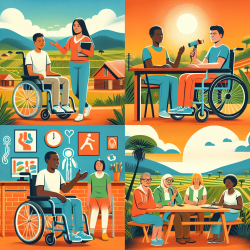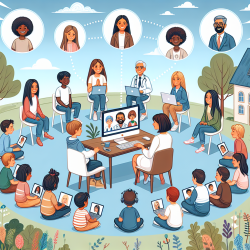In the realm of disability advocacy and support, the integration of individuals with spinal cord injuries (SCI) into society remains a significant challenge, especially in less-resourced settings like rural Tanzania. The recent study "Social participation of individuals with spinal injury using wheelchairs in rural Tanzania after peer training and entrepreneurial skills training" sheds light on the transformative power of targeted training programs. This research underscores the critical role of peer training and entrepreneurial skills in enhancing social participation and advocating for equal opportunities.
The Power of Peer Training and Entrepreneurial Skills
The study conducted by Motivation, a nonprofit organization, and Moshi Cooperative University highlights the impact of peer training and entrepreneurial skills training on individuals with SCI. These programs aim to enhance occupational engagement by providing community-based rehabilitation services. Participants in the study reported that these programs significantly improved their ability to integrate into their communities.
The research utilized a qualitative photovoice approach, allowing participants to capture meaningful photos that illustrated their experiences. This method not only highlighted the barriers they face but also empowered them to advocate for change. Two interrelated themes emerged from the study: influencing factors and empowerment.
Influencing Factors
- Activities and Participation: Participants engaged in various livelihoods such as repairing motorcycles or managing chicken coops. However, accessibility issues limited their opportunities.
- Personal Factors: Self-efficacy and self-esteem were crucial for participants. They emphasized the importance of believing in their abilities despite societal judgments.
- Environmental Factors: Inaccessible infrastructure, inadequate assistive technologies, and limited transportation options posed significant challenges.
Empowerment through Advocacy
The empowerment theme highlighted participants' desire to advocate for equal rights and raise awareness about disability issues. They emphasized the need for accessible infrastructure and services to minimize barriers to social participation. Participants expressed hope for future changes that would enhance their independence and inclusion in society.
Implementing Research Outcomes
For practitioners working with individuals with disabilities, this study offers valuable insights into improving service delivery. Here are some actionable steps practitioners can take:
- Enhance Training Programs: Incorporate peer-led approaches to provide wheelchair users with relevant knowledge and skills. This can improve independence and quality of life.
- Advocate for Accessibility: Work with local governments to ensure new buildings are accessible to all individuals, including those with disabilities.
- Promote Community Awareness: Use platforms like radio stations or community events to educate others about the challenges faced by individuals with disabilities.
- Encourage Further Research: Explore additional studies on social participation and accessibility to refine training programs and inform policy changes.
The Path Forward
The findings from this study highlight the need for continued efforts to improve accessibility, empower individuals with disabilities, and create awareness about daily challenges. By implementing these research outcomes, practitioners can significantly enhance social participation for individuals with SCI in less-resourced settings.
Together, we can work towards a more inclusive society where every individual has the opportunity to thrive.










